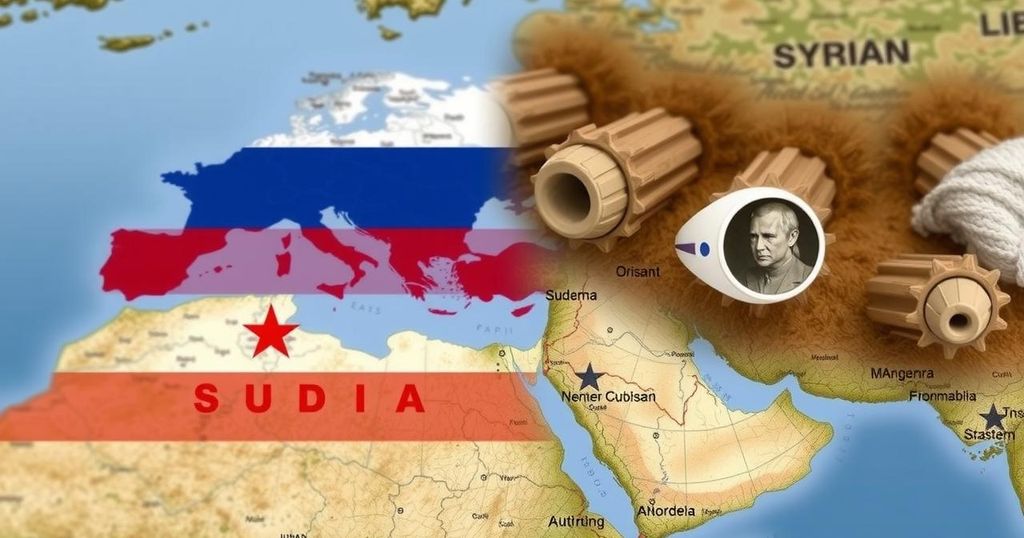Russia Faces Strategic Shifts: Potential Bases in Sudan and Libya Amid Syrian Loss
As Russia faces the loss of its naval base in Syria, efforts are shifting towards securing new military footholds in war-torn Sudan and divided Libya. The ongoing conflict in Syria endangers Russia’s ability to project power effectively in the Mediterranean, driving the search for alternatives that can compensate for the anticipated loss of strategic military facilities. With the Wagner Group’s involvement, new opportunities for influence and resource extraction may emerge in these regions, but significant challenges remain.
The geopolitical landscape for Russia has shifted significantly following the potential loss of its naval base in Syria, largely attributed to the advancing Syrian rebels. The installations in Syria, namely the Tartus naval base and Khmeimim airfield, have been pivotal for Russia’s military operations and power projection in both the Mediterranean and Africa. Experts note that the Kremlin’s ability to influence the region and conduct operations may diminish without these bases, as Russia seeks alternatives, potentially in conflict-ridden Sudan or the politically fractured Libya.
The naval base in Tartus has been crucial for the Kremlin, serving as a platform for asserting Russian power and countering NATO influences in the Mediterranean region. With Russian military activity increasing in Libya and the Sahel, the focus now remains on maintaining crucial maritime routes while compensating for the anticipated loss of Syrian facilities. Reports indicate that Russia may now lean towards Sudan, where discussions regarding a naval base near Port Sudan have taken place, reflecting a potential shift in strategy.
The Kremlin’s connection with Sudan is deepened by the Wagner Group, which not only provides military support but has also engaged in valuable gold mining operations previously secured by the group. Moscow has balanced its support between conflicting factions in Sudan, indicating an opportunistic approach to gain influence and resources amid ongoing chaos.
Similarly, Libya presents another opportunity for Russia to establish a foothold in North Africa. The country’s multiple factions offer a landscape for Russia to navigate and exploit its strategic resources, especially oil. The Wagner Group has historically played a considerable role in supporting General Khalifa Haftar, facilitating Russia’s military expansion and influence, particularly with plans to construct a naval base in Tobruk.
This dual focus on Sudan and Libya represents a strategic response to potential setbacks in Syria, but challenges remain. Analysts caution that Russia currently lacks the necessary agreements and facilities in either location to fully replicate the capabilities of Tartus, raising questions about the effectiveness of these prospective bases amidst prevailing local and international political complexities.
The recent developments in Syria signal a shift in the dynamics of Russian military strategy, particularly concerning its interests in Africa and the Middle East. Following a steadily increasing influence in Syria since 2015, the potential fall of President Bashar al-Assad presents a significant challenge, thus prompting Russia to identify alternative locations in war-torn nations like Sudan and Libya for future operations. Russia has extensively been involved in military endeavors in Africa, leveraging its resources and the Wagner Group to secure advantageous positions, but the loss of its Syrian base threatens to unravel these strategic gains.
In summary, the loss of the Syrian naval base poses a serious setback for Russia’s ambitions in the Middle East and Africa. As the Kremlin re-evaluates its position, potential new bases in Sudan or Libya may arise. However, significant obstacles remain in establishing these alternatives effectively, as Russia must navigate complex political landscapes while managing its military involvements across differing factions. The outcome of these operations could significantly dictate Russia’s geopolitical influence moving forward.
Original Source: www.intellinews.com




Post Comment